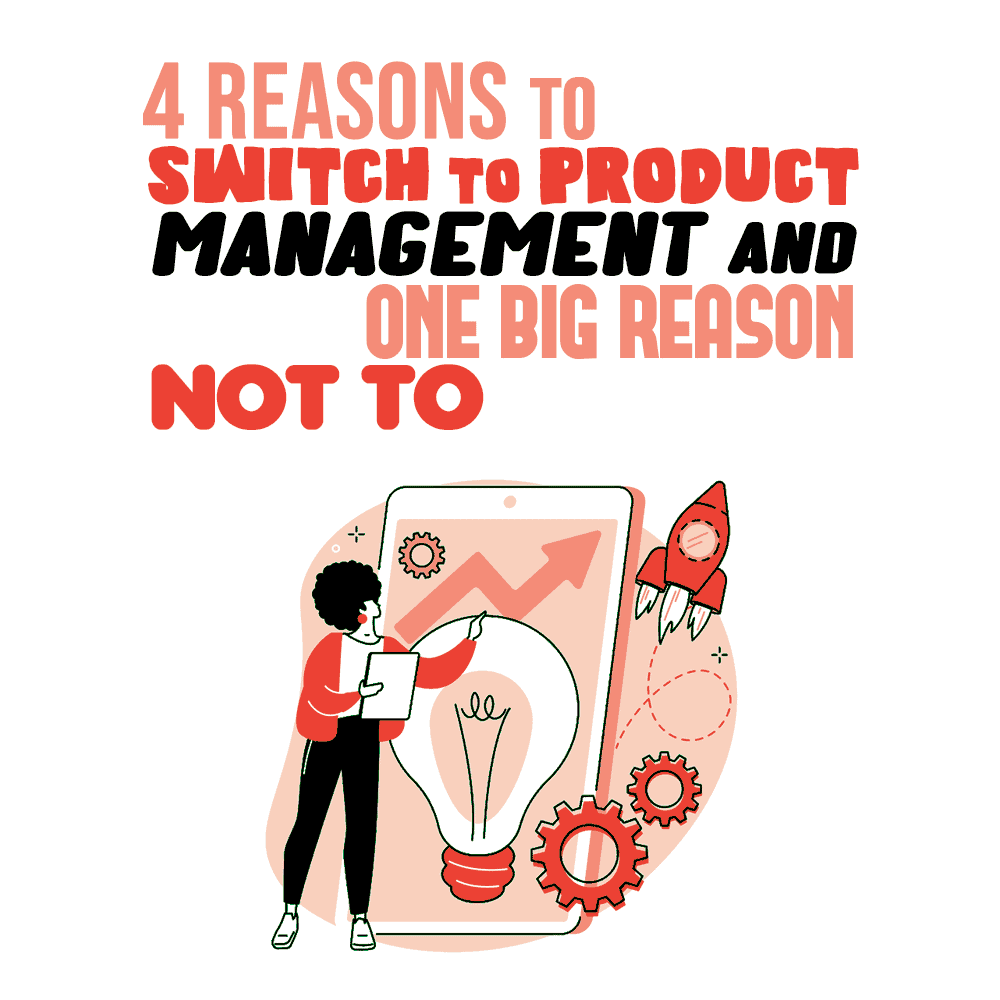
Product management works closely with the development team, and a programming background is a huge bonus for a product manager. It’s an ideal career path for programmers who want more career options, a larger role, or more people interaction. It doesn’t necessarily or always pay more right away, but it provides more long-term flexibility and often a different work life.
However, although I’ve seen many programmers find joy in becoming product managers, I’ve also seen others unfortunately find misery. While closely related to development, the scope of the product management role and the actual day-to-day tasks are wildly different.
Therefore, it’s important to know exactly what’s involved in this opportunity so that you can decide whether this switch is right for you. This is exactly what I will show you in this post, so read on!
Switch If You Want a Larger Voice and Broader Responsibility
As a programmer, you’re primarily responsible for writing clean, maintainable, and bug-free code. You’re not responsible for whether customers use new features or whether these features lead to more revenue. Depending on the size of the organization, your internal impact or “voice” may be limited to implementation details.
Product managers, on the other hand, have a tremendous amount of responsibility. The fate of the organization or product could rest on you and your fellow product managers’ ability to select the right strategy and the correct features to implement that strategy.
Speaking from personal experience, it feels horrible when a feature that took six months to build goes unused. It highlights a failure to conduct proper research or create a user-friendly product experience. It wasted months of the development team’s time that could have been spent on better features.
If you’re hungry for having a bigger say in the direction of your product and are willing to be directly responsible for its success, becoming a product manager would be a great opportunity for you.
Switch If You Want More Interaction and Communication
Product managers interact with every branch of an organization: developers, customers, account managers, sales reps, executives, and prospects. You will talk to everyone, all the time and in every form. You’ll conduct interviews, pitch ideas, demonstrate features, lead meetings, speak at conferences, and participate in sales calls.
Your primary responsibility will be planning the future of your product and creating a product roadmap. But the only way to achieve that vision is through constant two-way communication.
You must listen constantly to everyone in order to gain the information and insight you need to make product decisions. And the only method of influencing the product direction is by clearly communicating the product vision to all the stakeholders. The development team needs clear specifications, the sales team must understand what the new feature does and doesn’t do, and the support team requires comprehensive and timely documentation.
And when you’re not actively communicating in person, you’re writing feature specs, bug reports, documentation, presentations, marketing copy, and thousands of emails.
The stakes are high. A minor miscommunication may result in more emails, but even worse, it may also result in squandered developer time or an upset customer. If you’re uncomfortable in your communication abilities, you can learn to avoid awkwardness or practice your writing skills.
If you’re ready for a dramatic increase in communication and interaction, product management would definitely offer you that!
Switch If You Want Broader Career Opportunities
Product management is a flexible career path. Generally speaking, a good product manager is an excellent strategist, prioritizer, researcher, and communicator. Those abilities translate well into many different roles. Just as product managers are hired from a wide variety of other positions (programmers, designers, analysts, marketers, etc.), they can successfully move into many different positions.
After a few successful years in product management, you can continue into senior product manager roles or, depending on your interests and knowledge, move into other senior roles. With a broader product strategy experience, you’ll be better equipped for CTO roles or founding a startup. You’ll also be well-suited to operational roles or even marketing and communication jobs.
If expanding your career options beyond programming is important to you, product management is something you should consider.
Switch If You Want To Expand Your Skill Set
Product managers get their fingers into everything. You’ll become involved in design, development, UX, marketing, accessibility standards, API design, and much more. Be prepared to spend a lot of time educating yourself on these additional fields.
Depending on the size of your organization, you may be making decisions in these areas or merely consulting with internal teams and experts. At a minimum, you’ll be forming opinions about the level of investment to make in each area. You’ll need to understand the trade-offs between getting to market faster and having an amazingly beautiful product.
You’ll also need to think one step ahead of the market and build a product for what your customers need next. Strangely, in your effort to understand your customers’ needs, you may even become more knowledgeable about their job than they are. I learned a great deal about marketing strategy from running a content marketing software platform. It was like learning how to do two jobs at once.
If you’ve ever wanted to do more than write code, you’ll love product management.
Don’t Switch If You Love What You Do Now

If you love writing software all day, just keep at it. In some of my roles, I was fortunate enough to work on minor frontend projects or develop rough prototypes to show customers and stakeholders. But I largely had to give up development work. If you enjoy programming more than anything else, don’t give it up.
And if you’d prefer not to spend your day interacting and communicating with others, then don’t. It can be overwhelming and exhausting, and I’m only a mild introvert.
If you’re happy with your career options, stay in development. There’s lots of flexibility. You can keep programming forever or move into management, create a startup, start a freelance business, or many other paths, even without passing through product management first.
Next Steps
If switching to product management sounds like the right move, you should apply for some jobs, but most importantly, start practicing product management right now. Speak up for yourself, your product, and the customer. Voice your opinions when discussing new features or product strategy but also listen critically to the feedback your ideas receive. Ponder the responses to your ideas, and use those reactions to strengthen your product vision.
View the next few months as an opportunity to practice the role of product manager while you’re still working as a developer. Good technical managers and product managers will value and encourage your thoughts, and those thoughts will definitely be noticed by the product management team.
Immediately start exploring other facets of the product development and go-to-market life cycle such as UX and UI design, product marketing, or documentation writing.
If you’re unsure about product management, in many organizations you can ask to work part-time as a product manager while remaining on the development team. Working part-time lets you test the waters and demonstrate your ability to the rest of the organization (while keeping your salary). You could ask to shadow the product management team for a day or two and see what’s like in that role.
And if the above description of product management doesn’t excite you, that’s OK! Frankly, there’s no wrong choice here, nor is any choice permanent. Whatever you decide to do, relax and enjoy it.
